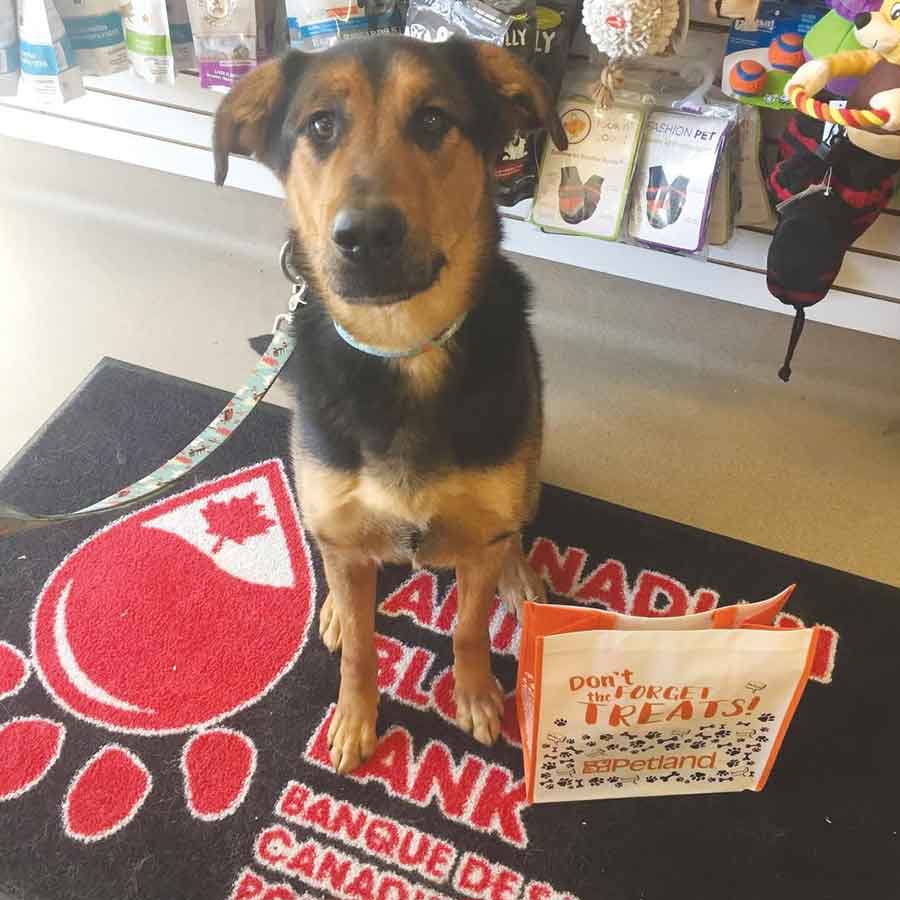The need for dog blood donations is higher than ever, and your pet could save another dog’s life in just 30 minutes.
The Canadian Animal Blood Bank (CABB) supplies veterinary clinics across the country with canine blood collected at donor clinics – including one scheduled for Aug. 26 from 10 a.m. to 3 p.m. at the Morden Veterinary Clinic.
Sarah Dalrymple, CABB executive director, said animal blood donation is not a subject to be taken lightly.
“Animals – just like humans – can suffer from a lot of different life-threatening conditions that require the use of blood donations,” she said. “We want to make sure dogs and the clinics have access to this – it could be the difference between life and death.”
Dalrymple described the CABB as “Canada’s best-kept secret” and said staff have noticed increased demand from veterinary clinics.
Blood products help treat dogs with cancer, rat poison toxicity, immune-mediated diseases, surgical or trauma injuries, anemia and parvovirus.
“We are facing shortages all over Canada for both dog and human blood donations,” she said. “While volume-wise human blood might have higher demand, we are all on the same page when it comes to needing blood to save a life.”
Zeus, a soon-to-be eight-year-old German shepherd–golden retriever mix, has made eight donations with the CABB and three additional Morden Veterinary Clinic exclusive donations. His sister, Lucky, is also a registered CABB donor.
Their owner, Taryn Wieler – a registered veterinary technician at the Morden Veterinary Clinic – said dog blood donations are invaluable to the veterinary community.
“In more cases than not, we are running into situations where dogs need blood transfusions,” she said. “Being a rural clinic, it’s tough trying to find access to those materials, so the donations mean the entire world to us, the dog, and the owner.”
Wieler registered Zeus for his first donation shortly after his first birthday. Over the years, the process has become second nature to him – he knows it’s a matter of lying down, giving blood, and getting treats afterwards.
Donating is free, quick and beneficial for dogs and their owners. Each appointment lasts about 30 minutes, but the donation itself takes just five minutes. At the appointment, a CABB team member will ask questions about the dog’s health, take their temperature and weight, shave a small patch of fur near the neck, collect the blood and finish with treats and belly rubs.
“We always have our patient and donor in mind and want to make this a peaceful, quick and easy process for everyone. If we notice any signs of distress, we stop right away,” Dalrymple said.
Similar to humans, approximately 400 ml of blood is taken, tested and sent to clinics across Canada. CABB provides complimentary testing for blood-borne diseases, heartworm, Lyme disease and other vector-borne illnesses, and shares the results with the owner.
Other benefits include:
• One complimentary blood product for each unit donated, should it be needed
• Free microchip identification after five donations
• Bandana and blood donor tag
Milestone dog tags every five donations
• Free belly rubs
• An opportunity to save another dog’s life
“Once you’ve registered for a donor clinic, we like to say you are a pack member for life,” Dalrymple said. “We want to give lots of love back to our donors because they truly are making the difference in another family’s life.”
Dogs can donate every three months or when requested by CABB. Eligible donors must be between one and eight years old – though they can donate until age 10 – healthy, even-tempered, weigh more than 25 kilograms and be up to date with vaccinations. It’s strongly recommended they are on heartworm and tick prevention.
Owners are asked to follow some guidelines before and after a donation. Dogs should avoid eating a full meal within six hours of the appointment, receiving acupuncture within 48 hours, taking antibiotics within seven days, or having dental work or vaccinations within 14 days. After donating, they should drink plenty of water, enjoy their favourite treats, avoid vigorous exercise for the rest of the day, and not wear a choke or prong collar for 48 hours.
“If your dog can tolerate laying on their side and hanging out with us for a bit, we have a really good system set up for donations – and the more dogs the better,” Wieler said.
The Morden Veterinary Clinic hosts drives every three months, and while registered patients make the process smoother, any healthy dog is welcome.
Wieler recommends owners be comfortable with seeing blood products so they can comfort their dog during the donation. If not, staff are happy to step in if it means bringing in another donor.
Dogs can be registered to donate online at www.canadiananimalbloodbank.ca/register-your-dog/. Dalrymple thanked every donor, clinic and supporter for helping make the program a success.
“It’s because of you we are able to capture this beautiful moment where a dog can connect with its owner, all while saving a life,” she said. “It’s moments like these that prove we can find a way to bring the community together.”
Founded in 1996 by Winnipeg veterinarian Dr. Ken Mould, CABB has collected more than 23,000 donations from more than 2,000 dogs. More than 900 dogs are active donors, and the program now operates in Manitoba, Ontario, Alberta, Nova Scotia, and soon British Columbia. CABB also provides about 250 units of blood per month, and supports feline transfusions – though cats must be sedated to donate. Financial donations can also be made online to help keep blood accessible for veterinarians.
